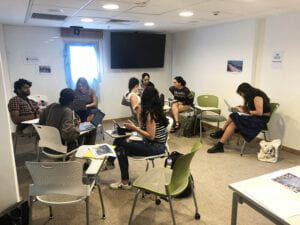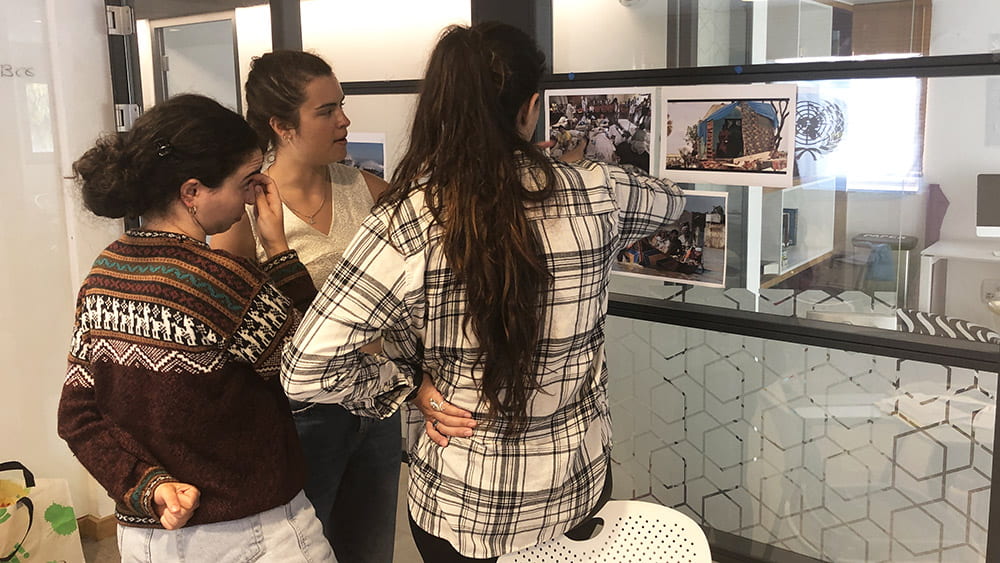In a humanitarian crisis, the World Health Organization’s Strategic Health Operations Centre (SHOC) in Geneva, Switzerland, leads the response and offers coordination, information, monitoring, and other critical services and resources to the international community. At NYU Tel Aviv, Dr. Inon Schenker provides a unique opportunity for students to gain experiential understanding of SHOC through the War on Epidemics simulation. First launched by Dr. Schenker at Ben-Gurion University of the Negev, the simulation has been a training ground for hundreds of students at Israeli universities. Now at NYU Tel Aviv, the War on Epidemics is part of the course Epidemiology for Global Health, though Schenker welcomes any students eager to participate.
Realistic Scenarios Bridge Theory and Practice
In a room modeled on the SHOC’s setup, students work together to develop real-time responses to an unfolding crisis. This year’s simulation was based on the 2004 tsunami that devastated over a dozen countries in Southeast Asia. Students were briefed with real footage, then charged to consider emerging issues like sanitation, care for the injured, information communications, and the potential for the displaced populations to experience health risks such as infectious diseases, mental health conditions, and trauma. As the simulation progressed, the team was notified that a group of 1,000 young people were trapped on a mountain without shelter or food. Throughout the simulation these scenarios were on the clock, giving students a sense of real-life urgency.
 During the simulation, Ansley Fiorito, a Biology and Global Public Health major, was the UNICEF adviser on youth in emergency situations. She describes learning how operation centers support teams on the ground through their ability to take a different perspective on the situation. “Both roles are valuable, but when you’re in the midst of chaos, it can be challenging to make decisions that benefit everyone in the long run.” Sejal Porter, a Biology and Global Public Health major on the prehealth track, echoes the importance of a variety of experts. “As an epidemiological adviser, my role was to prevent a future threat of disease instead of focusing on the current, pressing impacts of the crisis.” Ansley adds, “It was incredible to see everyone work together toward a common goal.”
During the simulation, Ansley Fiorito, a Biology and Global Public Health major, was the UNICEF adviser on youth in emergency situations. She describes learning how operation centers support teams on the ground through their ability to take a different perspective on the situation. “Both roles are valuable, but when you’re in the midst of chaos, it can be challenging to make decisions that benefit everyone in the long run.” Sejal Porter, a Biology and Global Public Health major on the prehealth track, echoes the importance of a variety of experts. “As an epidemiological adviser, my role was to prevent a future threat of disease instead of focusing on the current, pressing impacts of the crisis.” Ansley adds, “It was incredible to see everyone work together toward a common goal.”
Dr. Edan Raviv, assistant director of academics at NYU Tel Aviv, notes that experiential learning is an important bridge between intellectual and practical knowledge. “This is especially critical in a field like public health,” he says, “which requires students to understand complex technical science on the one hand and the public, socioeconomic, and political causes and implications of public health on the other.”
When Learning Leads to Impact
Simulations like these can even transform future, real-time outcomes. Dr. Schenker offers one illustrative example: In 2015 a cyclone was approaching Chennai, India, the hometown of one of his former Ben-Gurion University of the Negev students, Sri Janani. Having participated in the War on Epidemics simulation just a few months earlier, Janani knew how to organize an operations center and bring together members of her community and local nongovernmental organizations. Through the spread of information, organization of supplies, and evacuation of those in vulnerable areas, Janani estimates they helped over 170 families.
Dr. Schenker anticipates the next War on Epidemics simulation at NYU Tel Aviv will run in the spring of 2024. “Every NYU student can benefit from participating in a simulation like this. It is highly educational but also a fun way to build real-life experience and skills,” he says.
Dr. Schenker is happy to work with NYU campuses and academic locations on adapting the simulation to their local contexts. His contact email is is2760@nyu.edu.
Written by Auzelle Epeneter
